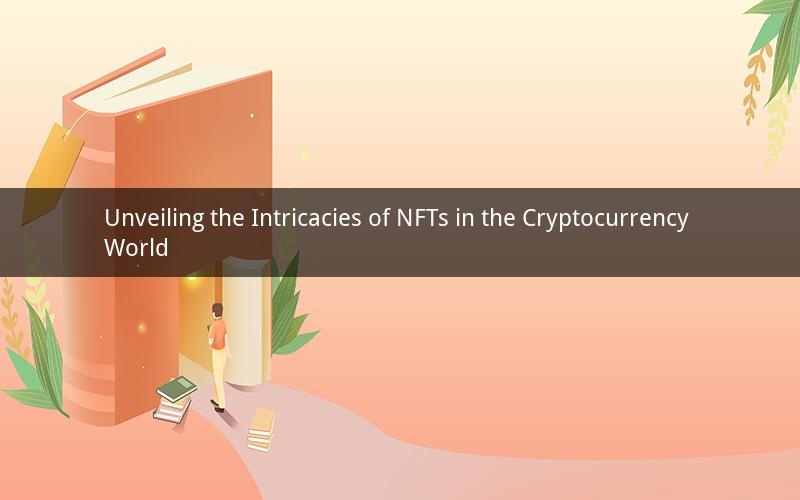
In the rapidly evolving digital landscape, the term "NFT" has emerged as a pivotal concept in the cryptocurrency domain. NFT stands for Non-Fungible Token, a unique digital asset that has captured the attention of artists, collectors, and investors alike. This article delves into the essence of NFTs, their significance in the crypto world, and the potential they hold for the future.
Understanding NFTs
At its core, an NFT is a digital certificate of ownership that verifies the authenticity and uniqueness of a particular asset. Unlike cryptocurrencies like Bitcoin or Ethereum, which are fungible and can be exchanged on a one-to-one basis, NFTs are non-fungible, meaning each token is distinct and cannot be replicated or exchanged on a like-for-like basis.
The blockchain technology underpinning NFTs ensures transparency and security. Each NFT is minted on a blockchain platform, such as Ethereum, and assigned a unique identifier that distinguishes it from other tokens. This unique identifier, often in the form of a token ID, is stored on the blockchain and can be verified by anyone with access to the network.
The Significance of NFTs in the Crypto World
1. Art and Collectibles
One of the most notable applications of NFTs is in the art and collectibles market. Artists can tokenize their creations, providing a digital certificate of ownership that verifies the authenticity and provenance of their work. This has opened up new avenues for artists to monetize their work and gain exposure to a global audience.
Collectors can now own digital art pieces, music, and other collectibles as NFTs, ensuring their ownership and uniqueness. This has sparked a thriving secondary market for digital assets, with high-profile sales and bidding wars becoming common occurrences.
2. Gamification
NFTs have also found their way into the gaming industry, offering players ownership and monetization opportunities for in-game assets. Players can earn, buy, and sell unique digital items, such as skins, characters, and weapons, as NFTs. This has incentivized developers to create more engaging and interactive games that reward players for their participation.
3. Real Estate and Asset Tokenization
The concept of NFTs is not limited to digital assets; it has the potential to revolutionize traditional industries such as real estate. By tokenizing real estate properties, developers and investors can fractionalize ownership, making high-value assets more accessible to a broader audience. This could lead to increased liquidity and innovation in the real estate market.
4. Identity and Credentials
NFTs can also serve as a means of verifying identity and credentials. Educational institutions, professional organizations, and employers can issue digital certificates, degrees, and other credentials as NFTs, ensuring their authenticity and reducing the risk of fraud.
5. Fashion and Luxury Goods
The fashion and luxury goods industry has also started exploring the potential of NFTs. Brands can tokenize limited-edition products, providing collectors with a unique digital certificate of ownership. This could lead to new business models and revenue streams for the industry.
The Future of NFTs
As the cryptocurrency world continues to evolve, NFTs are poised to play a significant role in shaping the future. Here are some potential developments:
1. Increased Adoption
With the growing popularity of NFTs, we can expect increased adoption across various industries. This will likely lead to a more robust and diverse ecosystem of digital assets.
2. Cross-Platform Integration
NFTs may soon be integrated with other blockchain platforms, enabling interoperability and cross-chain transactions. This will facilitate the seamless transfer of assets across different networks.
3. Regulatory Framework
As NFTs gain traction, governments and regulatory bodies will need to establish a framework to govern their use. This will ensure compliance with existing laws and protect consumers from fraudulent activities.
4. Enhanced Security
Blockchain technology will continue to evolve, making NFTs even more secure and resistant to hacking and fraud.
5. Decentralized Autonomous Organizations (DAOs)
NFTs could play a crucial role in the rise of DAOs, enabling decentralized governance and decision-making processes in various industries.
In conclusion, NFTs have emerged as a groundbreaking concept in the cryptocurrency world, offering unique opportunities across various industries. As the technology continues to evolve, we can expect NFTs to become an integral part of our digital lives.
Questions and Answers:
1. What is the primary difference between NFTs and cryptocurrencies?
Answer: The primary difference is that NFTs are non-fungible, meaning each token is unique and cannot be exchanged on a one-to-one basis, while cryptocurrencies are fungible and can be exchanged on a like-for-like basis.
2. Can NFTs be used to verify the authenticity of physical assets?
Answer: Yes, NFTs can be used to verify the authenticity of physical assets by tokenizing them and assigning a unique digital certificate of ownership.
3. What are the potential benefits of using NFTs in the gaming industry?
Answer: NFTs can provide players with ownership and monetization opportunities for in-game assets, incentivizing developers to create more engaging and interactive games.
4. How can NFTs revolutionize the real estate market?
Answer: NFTs can fractionalize ownership of high-value assets, making them more accessible to a broader audience and increasing liquidity in the real estate market.
5. What challenges do NFTs face in terms of regulatory compliance?
Answer: NFTs face challenges in terms of regulatory compliance, as governments and regulatory bodies will need to establish a framework to govern their use and ensure compliance with existing laws.